Sound & Fury : Student Researches the Music of Video Games
Video Game Soundtracks Topic of Research for Music Ed Major
Story updated: December 8, 2016
Melissa Mazzei has been selected to present her research at the the 2017 Pennsylvania Music Educators Conference, to be held April 21 at the Bayfront Convention Center in Erie. The title of her presentation is "Music Education and Gaming: Interdisciplinary Connections for the Classroom."
Session Description (to be published in the PMEA Journal): This session will review methods for music educators to develop and implement standards-based lessons that include musical concepts and compositional techniques from popular video games including "Civilization V," "Outlast," and "Assassin's Creed." Participants will discuss diverse musical examples and creative assignments for the music classroom.
“It is quite an honor for her to be selected to present as an undergraduate student,” says Kathleen Campbell, music professor and director of the Music Program at Seton Hill.
Original story posted April 26, 2016.
One might assume that the music and sound effects used in popular video and computer games are created using keyboards rather than traditional instruments. Not always so, discovered music education major Melissa Mazzei.
"In 'Outlast,' Mr. Laflamme uses a technique where he runs a violin bow along a suspended cymbal, and it creates the sound of a person wailing," Melissa says. "So what he did was start off with only one bow. Then he used two, three, four, etc. and he layered it until it was a cacophony of voices! When you're playing the game, and your character is sitting, alone, in the pitch black, you literally feel the tension creeping up. The sound gets louder and louder so you feel like something's getting close and closer and closer to you."
Melissa interviewed Samuel Laflamme, a well-known composer for video games, movies and TV, as part of an Ethnographic Research Project in her World Music course.
"Each student in the course selects a topic, completes field work interviews and participates in the culture, and presents their research findings to the class," says John Seybert, Ph.D., professor of music and music education coordinator at Seton Hill. "Student projects range from interviews with famous composers, organizers and musicians for international/national/regional musical events, and investigations of the musiculture of diverse cultural groups."
"I wanted to cover many different genres so I could compare how composing differs, not only from person to person, but also project to project."
Melissa began her project by interviewing avid gamers, to get a feel for "the fandom aspects, and the subculture of how we enjoy games. .. gaming etiquette, rules, fan art, fanfiction, cosplaying ["costume playing," or dressing as a favorite game character], role-playing, things like that."
Then she started reaching out to composers. Melissa knew she wanted to highlight the game "Civilization V," in her project because of its "gorgeous soundtrack," so the award-winning composers of that game were the first on her list.
"I sent emails to Geoff Knorr and Michael Curran over Easter break on a whim, not really expecting anything," she says. "And then BAM! In comes an email from both! They said they'd be willing to answer questions!"
In "Civilization V," both Mr. Knorr and Mr. Curran composed themes for significant historical figures that represent each civilization the player can "lead."
"Elizabeth I of England, for example, Napoleon Bonaparte for France, Wu Zetian of China, to name a few," Melissa says. "They took into account time period, and Mr. Curran said their goal was to, 'achieve a cinematic orchestral style that fit the culture we were writing for. The result is modern yet it has qualities, either melodic or through the instrumentation, that evoke the historical place and time.' Mr. Knorr also replied that they, 'intended to underscore the personality of the leader.' "
Melissa, "thrilled and heavily empowered" by her interaction with Knorr and Curran, "sent a slew of emails: to game writers, visual effects artists, voice actors, and even a stunt man who does motion capture acting for the animators!"
While she ran into some copyright and confidentiality concerns - the gaming world is highly competitive; video and computer game annual revenue is in the billions - Melissa found that the majority of the people she contacted were willing to participate in her project as long as no specific details of gameplay were divulged.
"I wanted to cover many different genres so I could compare how composing differs, not only from person to person, but also project to project," Melissa says. "A horror composer like Mr. Laflamme is not going to want the same sound as the trivia-game 'You Don't Know Jack.' "
Melissa is in the process of finalizing her research, which includes interviews with seven composers, a writer, three sound and music designers, a stunt man, six voice actors and four gamers. Specific games researched include "Outlast," "Civilization V," "Assassin's Creed," "You Don't Know Jack" and "Mortal Kombat X."
One common theme she has identified is that "composers go for a 'feeling' more so than coming up with a melody, then an accompaniment to that melody," she says.
"What I've learned from the gamers is that there is really no set way to experience gaming or enjoy it beyond playing it," she says. "While there are attitudes (good and bad) that dictate what is "normal" in the community, everyone really does their own thing. There is a LOT of detail in every one of those subcultures though, especially role-playing and cosplaying."
"Being a gamer myself, my project grew into a desire to learn about the whole game-making process, not just the music," she adds. "This has been a wild ride from start to finish!"



